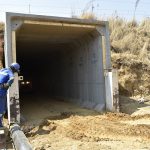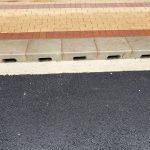As the manufacturing industry comes to terms with an economic slowdown and skills shortage, organisations such as Rocla, the leading specialist in precast concrete infrastructural products and solutions in southern Africa, are making an important contribution in skills development and training.
The Rocla Academy is playing an increasingly important role in the precast concrete industry in imparting knowledge and skills to improve standards in the implementation of the design, planning and installation of infrastructural products that impact on the long-term stability and sustainability of structures for bridges, roads, railways, sewerage and effluent to name a few.
Established in the late 1980’s, the Rocla Academy was established to effectively keep customers informed of the latest developments in its product range, as well as ensuring that correct procedures are followed in the specification, purchase, use and installation of these products. The academy is also widely known for the transfer of skills to emerging contractors, recently qualified consulting engineers, design engineers, foreman and site managers.
The Rocla Academy empowers contractors with useful information regarding best practice and correct installation techniques on all Rocla products. It gives contractors the opportunity to gain insights on all aspects of products used on site, as well as interactive problem-solving.
Alaister Goyns, owner of Pipeline Installation and Professional Engineering Services (PIPES) says “There are virtually no players in the (construction) industry that offer post-sale training and technical support for their products. Sharing thorough knowledge on the best application of products, ultimately contributes to a longer life cycle, which is very important in supportive infrastructure and environmental waste management, where Rocla’s products are most widely used.”
The information presented at the Rocla Academy has been developed in conjunction with the Concrete Product Manufacturers’ Association. The training sessions outline best practice methods for applications such as the hydraulics of stormwater culverts and installation of concrete pipes and culverts. Information and insight is also shared on the different loads and strengths of buried conduits. Factory visits, which provide a practical dimension to the information shared, also form part of the training sessions. Discussions are held after each session to deepen understanding of the material learnt.
The Rocla Academy has been recognised as a certified training institution by the Engineering Council of South Africa (ECSA) through which industry professionals can gain Continuing Professional Development (CPD) points. The ECSA recognises and awards certification for structured, educational, developmental activities conducted for the Industry. Accredited activities include conferences, large group workshops, seminars, refresher courses and lectures. Rocla runs more than 12 training sessions per year as compared to the industry requirement of 4 sessions per year.
The training sessions are organised to meet customer needs and are run at all eleven of Rocla’s manufacturing sites across South Africa as well as in areas such as East London and Lesotho, where Rocla has no factory.
Craig Waterson, Marketing Director and Co-ordinator for the Rocla Academy says, “The focus is not only on the enhancement of knowledge, skill and competence, but also on building relationships with stakeholders and understanding their needs. Rocla has designed the content to ensure that it meets ECSA standards and also tailors each session for the specific target audience which may vary from a municipal engineer to a site foreman. The knowledge passed on through the academy will ensure that customers and ultimately communities enjoy the value that our products add.”
The Rocla Academy is the only supplier-facilitated institute that offers skills and competency training to external stakeholders. The establishment of the academy is aligned to Rocla’s aim to partner with its customers to ensure that its products add value wherever they are applied.







